Politics, at its core, is all about survival.
And few can argue that Micheál Martin is anything other than a survivor.
The Fianna Fáil leader has become Taoiseach for the second time in his career after the Dáil voted him and his would-be government back into power.
For someone who until recent years was the subject of whispers that he would be the first leader of Fianna Fáil never to have been taoiseach, and who spent his first decade as Fianna Fáil leader quelling backbench upheavals, it is quite the feat.
Add to that the fact Mr Martin is the only minister from the Celtic Tiger era crash still standing, and who has held his Cork South Central seat for 36 years, the next Taoiseach's survival instincts should not be underplayed.
But he faces a lengthy list of unresolved problems and newer ones on the horizon, ranging from housing to health to the Donald Trump presidency to the economy.
All of it means that the first Cork Taoiseach since Jack Lynch will have to put all of what even his detractors accept is a politically tactical mind to full use as he attempts to survive, and succeed, during his second term at the head of government.
Early Years
Born in 1960 in Cork city's Turner's Cross area as the third of five children, Micheál Martin - whose father was a former soldier, bus driver and boxer, and whose mother was a home maker - has always been proud of his working class roots.
After attending Scoil Chroist Rí and Coláiste Chroist Rí, the future Taoiseach studied at University College Cork, where he received a Bachelor of Arts degree and subsequently a Masters in Political History, and where he became a prominent student member of Ógra Fianna Fáil.
After graduating from UCC, Mr Martin studied for a Higher Diploma in Education.
He was employed as a history teacher at the Presentation Brothers College in Cork city for a year, before formally entering politics in 1985 as a member of the then local authority, Cork Corporation.
That first formal step into politics led to Mr Martin being one of four Fianna Fáil general election candidates to run in Cork South Central two years later, in 1987.
He was unsuccessful in that first Dáil attempt, but when then Fianna Fáil leader and taoiseach Charlie Haughey announced a snap general election in 1989, Mr Martin ran again, this time winning a seat in the constituency - one he has now held for ten general elections in a row.
Time as a minister
Having cemented his place in Leinster House and being appointed to a number of cross-party Oireachtas committees, Mr Martin was re-elected in 1992 - the same year he also served as lord mayor of Cork City.
But while Fianna Fáil retained its position in government, it was not for long, with a number of controversies leading to the collapse of the coalition with Labour in 1994; the resignation of party leader Albert Reynolds and Fianna Fáil finding itself on the opposition benches under a new leader in Bertie Ahern.
Mr Martin, though, survived the resulting turmoil, eventually finding himself in Mr Ahern's opposition frontbench in 1995 when he was appointed as party spokesperson for Education and the Gaeltacht.
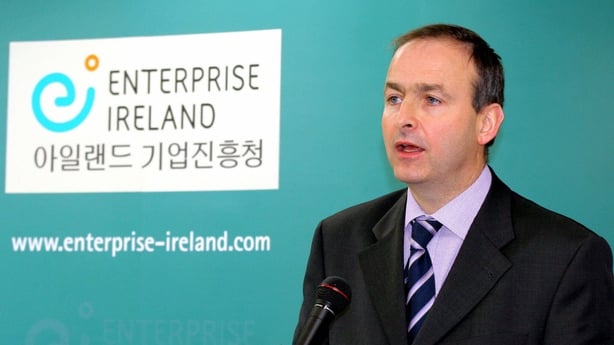
By the time Fianna Fáil re-entered government two years later in 1997, Mr Martin - if not seeing eye to eye with Mr Ahern - was an important part of the new taoiseach's cabinet, serving as education minister (1997-2000), health minister (2000-2004), enterprise minister (2004-2008) and foreign affairs minister (2008-2011).
Among his most high-profile roles during this time was as health minister, a period which Mr Martin has always been keen to emphasise coincided with the world-first smoking ban in pubs and workplaces.
It was not without its difficulties too, however, with Mr Martin often accused by medical organisations at the time for farming out decisions to independent reports - more than 100 during his tenure - instead of making ministerial decisions himself.
And, it should also be remembered, that while the actual replacement of the old health boards with the then-new HSE officially occurred under his successor Mary Harney, the decision to make the change did come under Mr Martin's ministerial period.
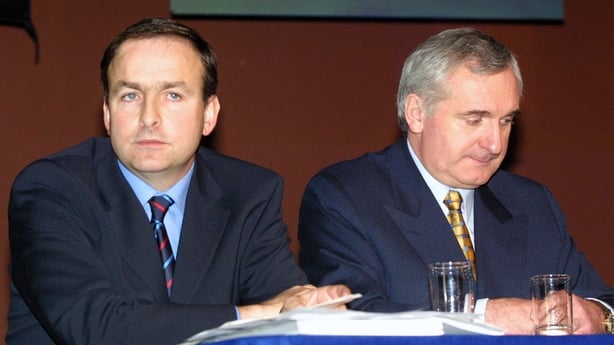
While education minister and enterprise minister, Mr Martin did take steps to address cost of living issues in society, by increasing spending in schools and removing legislation banning the sale of groceries below cost price.
But his term as foreign affairs minister - which took place when Brian Cowen became taoiseach in the summer of 2008 and just as the Celtic Tiger crash fully emerged - led to far more global dilemmas needing to be addressed.
During his two-and-a-half years in the role - a portfolio he has returned to in more recent times - Mr Martin was tasked with helping to oversee the Lisbon Treaty referendum as well as official visits to a Cuba that was opening to the wider world, the Middle East, the White House and China, as well as ongoing post-peace talks in Northern Ireland, an issue which remains close to his heart.
This period as foreign affairs minister also saw Mr Martin criticise the then Israeli blockade of Gaza in 2009, telling the Dáil in 2009 that after becoming the first western foreign affairs minister to visit Gaza since Hamas had entered government, he told Israel to end the blockade to help avoid "further bloodshed".
Push against Cowen
By late 2010, though, domestic rather than international matters were dominating the spotlight, with the Fianna Fáil-led government in freefall and on the verge of collapse.
After an infamous interview by then taoiseach Brian Cowen on RTÉ's Morning Ireland in September 2010, Mr Martin, alongside the Dermot Ahern and the late Brian Lenihan Jr, made it known that they each had an interest in replacing their colleague.
Mr Cowen's time in power stumbled along for another couple of months, but by mid January 2011, Mr Martin publicly said he would vote against Mr Cowen in a leadership confidence vote.
Brian Cowen survived that vote, and Mr Martin resigned as foreign affairs minister.
But a week later on 22 January 2011 - 14 years ago - Mr Cowen said while he would remain taoiseach he was stepping down as Fianna Fáil leader, with a groundswell of support for Mr Martin within Fianna Fáil's ranks soon emerging.
That night, Mr Martin - who had gambled by speaking out at Mr Cowen and seemingly survived - formally announced his interest in becoming party leader.
Despite competition from other candidates, he was elected the eighth leader of Fianna Fáil on 26 January 2011.
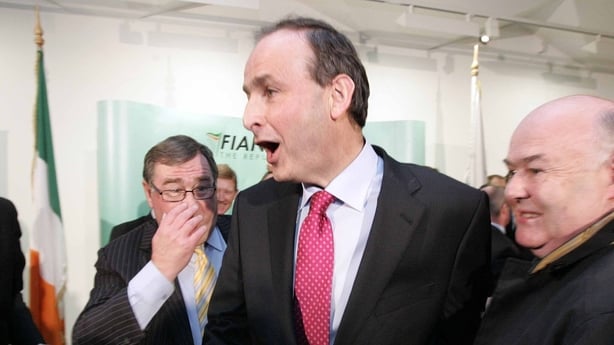
Rebuilding Fianna Fáil
Within weeks, Mr Martin was leading Fianna Fáil into the February 2011 general election - and a ballot box beating which was the worst the party had ever seen.
Fianna Fáil's first preference vote was cut in half. It lost 57 seats. And its 20 seat return was the worst performance in the party's history.
For so long seen as the biggest of big beasts in Irish politics, genuine talk from serious sources was of whether the party - which also had no TD in Dublin - had any future at all.
But, slowly, the party did begin to recover. And while the mist of time may mean it is forgotten by some now, even Micheál Martin's detractors would concede he played a key role in this slow, steady recovery, with Mr Martin publicly committing to renew Fianna Fáil "at every level".
A steady local elections result in 2014, where the party kept its 25% vote share and gained 49 seats, was balanced out by the party losing two of its three MEP seats in the European elections at the same time.
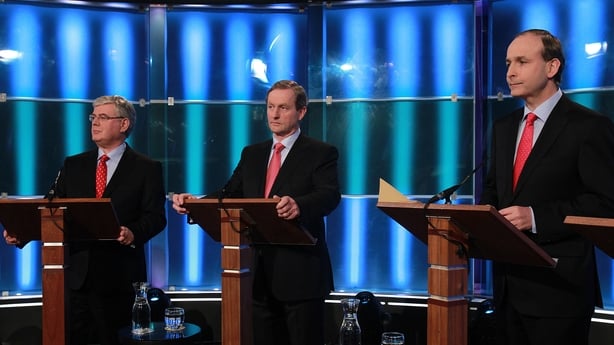
But despite the first of multiple rumours a revolt against the party leader could be on the cards, Mr Martin held firm, and was rewarded with a general election result which saw Fianna Fáil more than double its seats from 20 to 44.
Hardly spectacular, but solid. And crucially, enough to take advantage of a new-found weakness in Fine Gael - which had seen its seat numbers fall from 76 to 50 - and enter into a confidence and supply arrangement which saw Fianna Fáil "facilitate" the formation of a Fine Gael-Independents government, while giving Fianna Fáil much of the power from opposition.
The tactically sound manoeuvre, and the decision to enter into it, was to his supporters a classic case of Mr Martin's astute reading of medium-term rather than short-term politics, as it allowed Fianna Fáil an eventual bridge back to power.
His critics do point out that the benefits of the arrangement were severely diluted when Fine Gael replaced Enda Kenny with the more forceful Leo Varadkar a year later, and that the long-standing criticism Micheál Martin dithers too long on decisions led to Fianna Fáil failing to pull down the government when Fine Gael was at its weakest, was the real post-script of the deal.
But nonetheless, that confidence and supply period did help to bring Fianna Fáil back from the cusp of collapse to the doorstep of power, a view Mr Martin will no doubt believe has been proven by the two general elections that followed.
First term as Taoiseach
The first came in February 2020, an election Fianna Fáil will say it won and many commentators will say no one won due to the near three-way tie between it, Fine Gael and Sinn Féin.
That scenario led to more than 100 days of government formation talks, and the eventual formation of an historic coalition between the old civil war parties of Fianna Fáil and Fine Gael.
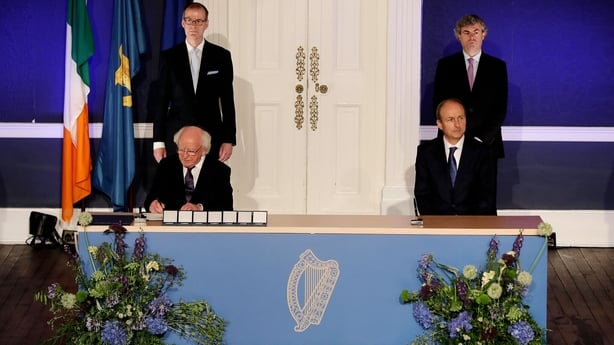
It led too to a lifelong ambition of Micheál Martin to become taoiseach being fulfilled, ending any notion he would be the first Fianna Fáil leader in history not to take up the role.
Under the 2020 deal with Fine Gael, Mr Martin became taoiseach for the first two-and-a-half years of the new coalition, from summer 2020 until December 2022, at which point he would be replaced by Fine Gael's Leo Varadkar.
No one will need reminding that the period in question was among the most complex in living memory, with the impact of Covid-19, lockdowns, the 6 January 2021 White House insurgency and the start of Russia's war on Ukraine all occurring during this time.
While he has publicly downplayed the fact, in part due to the far bigger impact of the pandemic on the wider public, the Covid-19 crisis did also impact on Mr Martin's personal political career.
After contracting Covid in March 2021, Mr Martin was unable to physically meet then US president Joe Biden at the White House - normally a career highlight for a taoiseach - while the realities of summer 2020 meant his family did not travel to see his own election by the Dáil to the role.
The man behind the politician
That human side of Mr Martin, like that of other politicians, is rarely mentioned due to the realities of political sparring, but it is important to note when trying to provide a rounded view of the person now set to become Taoiseach.
Mr Martin, a father of five, has had genuine tragedies in his private life which - like many others around the country and further afield - he and his wife Mary dealt with, with quiet dignity and self-respect.
Mary Martin, herself a former national youth organiser for Fianna Fáil and someone who is just as steeped in politics as her husband, is one of a small number of people who make up Mr Martin's real kitchen cabinet, alongside the likes of party general secretary Sean Dorgan, chef de cabinet Deirdre Gillane and strategist Pat McPartland.
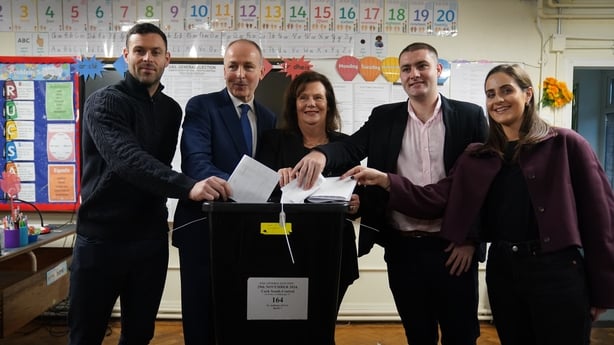
Indeed, it has been said that Mr Martin's loyal streak means his closest relationships are measured in not years but decades, a streak only rivalled by his long memory over a perceived wrong from a political or journalistic opponent.
Mr Martin has, unlike some politicians or people in the wider public, also shown an ability to change his views with the passing of time - his eloquent, and nuanced Dáil speech in the months leading up to the Eighth Amendment referendum carefully represented the concerns of old Ireland and the needs of its newer counterpart, adding a calm and important voice to the divisive debate.
And his ongoing connection to his working class Turner's Cross roots, a link of which he is genuinely proud, is - whether accepted or not by opponents - something he is known to hold close as a guide for his core social and political views.
Second term
How all of that will impact on Mr Martin's second term as Taoiseach remains to be seen.
Awaiting him in the in-tray in the Taoiseach's office will be multiple national and international crises, with a record number of people and children who are homeless, surging housing prices, an ongoing health service crisis, cost of living difficulties, the ongoing wars in Ukraine and the Middle East, economic fears, and the not so small matter of Donald Trump's second term as US president too.
Big political problems, and the need for big political answers, are likely to put incoming Taoiseach Micheál Martin's long-proven survival skills and astute political instinct to the test.







